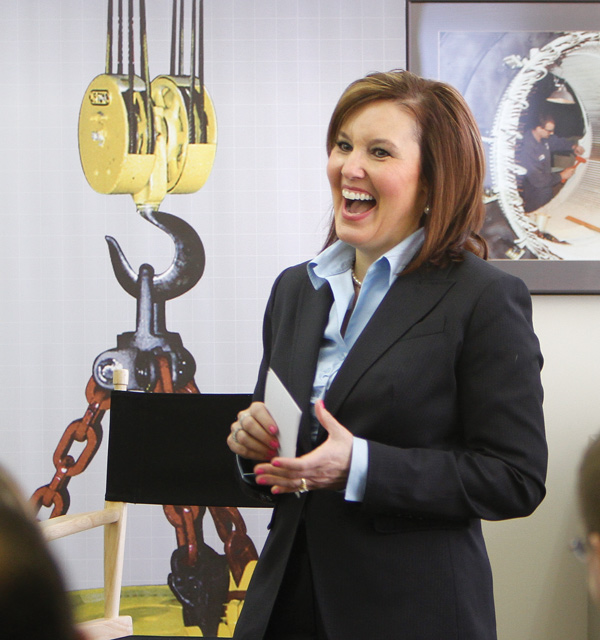Lt. Gov. Mary Taylor touts the governor’s tax proposal


Lt. Gov. Mary Taylor said the governor’s tax proposal, including a 50 percent cut for small businesses, will benefit the state’s economy. Taylor spoke Monday with local business owners at an event at City Machine Technologies Inc. in Youngstown.
YOUNGSTOWN
The governor’s tax proposal that includes a 50 percent tax cut for small businesses in addition to other sweeping changes to the tax codes will help Ohio’s economy grow, Lt. Gov. Mary Taylor said.
Speaking Monday with local business owners at an event at City Machine Technologies Inc., a Youngstown machine-repair shop, Taylor, a Republican, said the proposed tax changes in Gov. John Kasich’s $63.3 billion, two-year budget proposal would make it “easier to do business” in Ohio and attract companies to the state.
The small-business cut allows a deduction of up to $375,000 from the first $750,000 of business income.
“It’s a favorable, positive step for small businesses,” Taylor said at the first small-business panel discussion Taylor has had since the governor unveiled his proposed budget Feb. 4.
Kasich’s proposal calls for significant changes to the state’s tax system. Besides the small-businesses cut, Kasich wants to reduce the sales tax by 20 percent over three years and cut the state’s income-tax from 5.5 percent to 5 percent while applying it to a broad range of additional items.
Overall, the proposal would save $1.4 billion over three years, according to state tax officials. But that assumes every piece of the proposal is implemented.
Also, Kasich’s budget includes an increase in taxes on major gas and oil frackers with an estimate from his office that the tax would bring in about $155 million annually and grow to $415 million a year in the near future.
Democrats criticize the Republican governor’s proposal for doing “little for our small businesses that create jobs” and that it would tax “thousands of services and products [that] will actually have a negative impact on our economy,” said Jerid Kurtz, Ohio Democratic Party spokesman.
The Plain Dealer of Cleveland recently reported that about 80 percent of Ohio’s small-business owners potentially affected by Kasich’s proposal would save $400 or less per year.
About 575,000 small-business owners who report company income on their personal taxes — which qualifies them for the cut — have net income after payroll of no more than $25,000 annually, the newspaper reported citing information from the Ohio Department of Taxation. Those making $25,000 a year would receive $400 annual savings beginning next year.
Taylor declined to comment Monday on the article, saying she hasn’t read it.
But she said that any tax dollars saved by businesses and workers “will be reinvested back into the community and it most likely will be the local economy” for “entertainment activities” or dining out.
Under Kasich’s plan, several “entertainment activities” such as concerts, sporting events, amusement parks, fairs, museums and bowling would begin charging a 5-percent state sales tax if the state Legislature approves the proposal. Those activities currently aren’t taxed by the state.
“Lt. Gov. Mary Taylor is misleading when she claims the tax [dollars] would be reinvested back into the communities when, in fact, it will directly pay for a giveaway to Ohio’s wealthiest,” who will benefit from the small-business tax cut, Kurtz said.
Some business officials at Monday’s event said the tax cuts will be beneficial to their operations.
David Hughes, owner of Specialty Fab Inc., a custom-steel fabricator in North Lima, said Kasich’s proposal would save him about $17,000 to $18,000 annually, and he plans to install a new manifold system at his business that “will make us so much more efficient and make our rates more competitive.”
Tony Mirto, vice president of Rhiel Supply in Austintown, said he supports the governor’s proposal, even though he doesn’t know how much money his company would save. Rhiel sells janitorial supplies and equipment as well as pools, hot tubs and pool tables.
Unlike the federal government, the governor is offering a permanent solution to taxes, Mirto said. Though broadening the sales-tax base is an issue, the overall proposal would be positive and benefit the state, he said.
Tony Paglia, vice president of government affairs for the Youngstown/ Warren Regional Chamber, said reaction to Kasich’s proposal from many of the organization’s 2,600 members is positive.
A reduction in the sales, income and small-business taxes will help the chamber continue to successfully market the Youngstown area to business owners, he said.
 43
43
